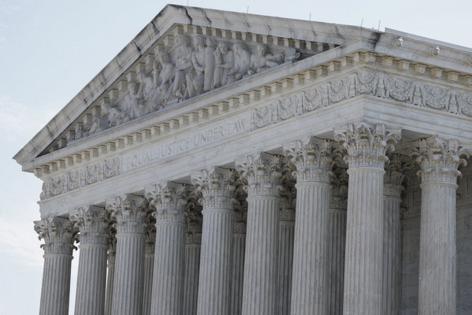Supreme Court again faces question of Trump immigration move
Published in News & Features
WASHINGTON — The Supreme Court could soon say more about the legal process for migrants whom the government decides to remove from the country expeditiously under a centuries-old wartime law, in one of several legal challenges happening in federal courts.
The justices early Saturday put a pause on the Trump administration’s efforts to deport alleged Venezuelan gang members from a Texas facility, after the American Civil Liberties Union filed an emergency application that said the government’s “lightning-fast timeline” did not giving the migrants “a realistic opportunity to contest their removal.”
Justices issued the administrative stay without any accompanying formal opinion, directing the Trump administration “not to remove any member of the putative class of detainees from the United States until further order of this Court.”
The case returns the issue to the Supreme Court just two weeks after the justices issued a ruling in a separate case that allowed the use of the Alien Enemies Act of 1798 under President Donald Trump’s proclamation. That ruling also required the government to give migrants a chance to contest their detention at the court with jurisdiction over where they are held.
The ACLU on Monday told the justices in a filing that the U.S. government failed to provide individuals threatened with deportation the sufficient time to content the claims against them.
“Instead of providing timely notice that would allow putative class members to seek habeas relief prior to removal, the government gave detainees an English-only form, not provided to any attorney, which nowhere mentions the right to contest the designation or removal, much less explain how detainees could do so,” the ACLU filing states.
“And officers told detainees they would be removed within 24 hours — in many cases, even less than 24 hours,” the ACLU wrote. “Under no plausible understanding of this Court’s ruling is that notice protocol satisfactory.”
The Trump administration in a filing Saturday said the Supreme Court should allow the legal process to play out at lower courts.
The ACLU challenge calls “for this Court to be the first to resolve due-process challenges to the adequacy of notice that designated enemy aliens receive, on behalf of a putative class that no court below has certified, on a nonexistent record,” the government wrote.
The government filing added that at a minimum, the Supreme Court should clarify that its temporary stay applies only to removals under the Alien Enemies Act, which would permit deportation under other authorities under immigration law.
The ACLU filing maintains that the stay is needed to keep its plaintiffs in the United States, in part because “of the government’s position that it need not return individuals, even those mistakenly removed.”
Judge James Wesley Hendrix of the U.S. District Court of Northern Texas, a Trump appointee, had issued an order Thursday in the case, in response to a request for relief by the ACLU, that denied intervention to keep the plaintiffs in the United States.
“The petitioners have not made a sufficient showing at this stage to convince the Court that the government will violate its representations to that effect or the instructions of the Supreme Court,” Hendrix wrote.
In contrast, other federal judges have issued orders in separate cases in Texas and New York blocking specific deportations based on requirements for due process, but those are limited to certain detainees and jurisdictions.
Justices Samuel Alito and Clarence Thomas dissented from the decision to issue a pause on the removals as the Supreme Court considers the litigation, asserting the court overstepped its bounds by issuing the temporary order at this stage.
“In sum, literally in the middle of the night, the Court issued unprecedented and legally questionable relief without giving the lower courts a chance to rule, without hearing from the opposing party, within eight hours of receiving the application, with dubious factual support for its order, and without providing any explanation for its order,” Alito wrote.
Rep. Pramila Jayapal of Washington, the top Democrat on the House Judiciary subcommittee on immigration, wrote in a social media post on Friday the posturing of the government in the case is alarming.
“SCOTUS ruled that Trump had to give people adequate notice before deporting them,” Jayapal writes. “Yet today, there are reports that he’s deporting 177 immigrants with under 24 hours’ notice — not enough time to assert due process. We cannot stand by as this admin continues to disappear people.”
Meanwhile, the Trump administration is asserting the legal holdups in removals under the Alien Enemies Act is effectively keeping members of the international gang Tren de Aragua in the United States.
Stephen Miller, the top White House adviser to Trump on immigration, responded to a social media post from a Fox News correspondent that said the migrants being blocked from deportation under the latest Supreme Court order had criminal records and suspected gang tattoos.
“This is who the Democrats are fighting to keep in your neighborhood,” Miller wrote.
The case is A.A.R.P et al. v. Donald J. Trump et al.
_____
©2025 CQ-Roll Call, Inc., All Rights Reserved. Visit cqrollcall.com. Distributed by Tribune Content Agency, LLC.







Comments